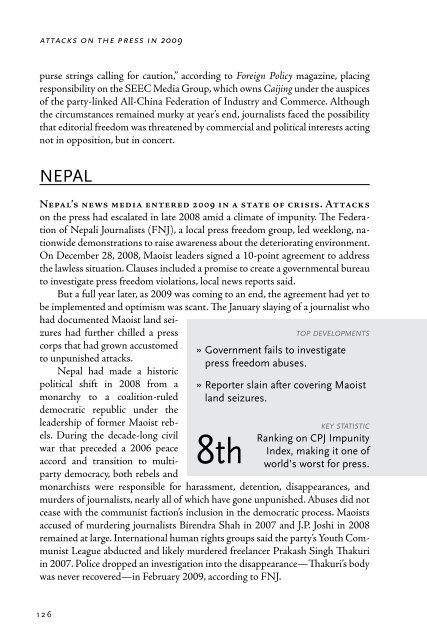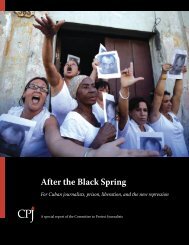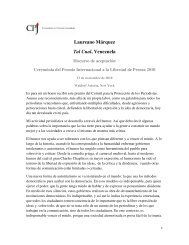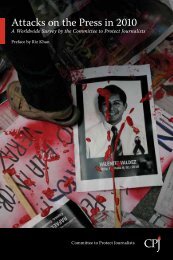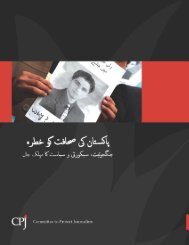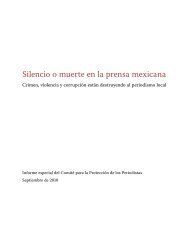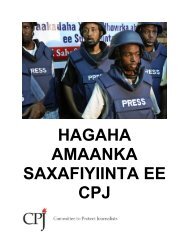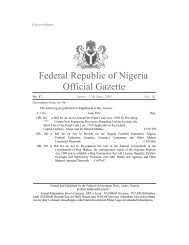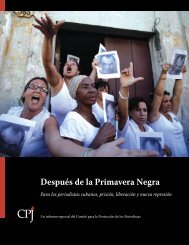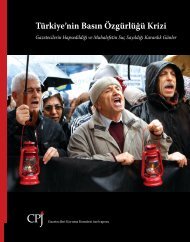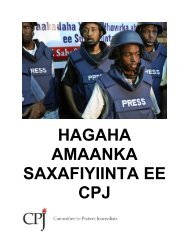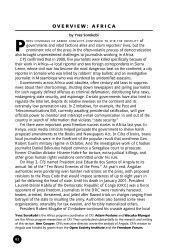Attacks on the Press - Committee to Protect Journalists
Attacks on the Press - Committee to Protect Journalists
Attacks on the Press - Committee to Protect Journalists
- No tags were found...
You also want an ePaper? Increase the reach of your titles
YUMPU automatically turns print PDFs into web optimized ePapers that Google loves.
attacks <strong>on</strong> <strong>the</strong> press in 2009asia: nepalpurse strings calling for cauti<strong>on</strong>,” according <strong>to</strong> Foreign Policy magazine, placingresp<strong>on</strong>sibility <strong>on</strong> <strong>the</strong> SEEC Media Group, which owns Caijing under <strong>the</strong> auspicesof <strong>the</strong> party-linked All-China Federati<strong>on</strong> of Industry and Commerce. Although<strong>the</strong> circumstances remained murky at year’s end, journalists faced <strong>the</strong> possibilitythat edi<strong>to</strong>rial freedom was threatened by commercial and political interests actingnot in oppositi<strong>on</strong>, but in c<strong>on</strong>cert.NEPALNepal’s news media entered 2009 in a state of crisis. <str<strong>on</strong>g>Attacks</str<strong>on</strong>g><strong>on</strong> <strong>the</strong> press had escalated in late 2008 amid a climate of impunity. The Federati<strong>on</strong>of Nepali <strong>Journalists</strong> (FNJ), a local press freedom group, led weekl<strong>on</strong>g, nati<strong>on</strong>widedem<strong>on</strong>strati<strong>on</strong>s <strong>to</strong> raise awareness about <strong>the</strong> deteriorating envir<strong>on</strong>ment.On December 28, 2008, Maoist leaders signed a 10-point agreement <strong>to</strong> address<strong>the</strong> lawless situati<strong>on</strong>. Clauses included a promise <strong>to</strong> create a governmental bureau<strong>to</strong> investigate press freedom violati<strong>on</strong>s, local news reports said.But a full year later, as 2009 was coming <strong>to</strong> an end, <strong>the</strong> agreement had yet <strong>to</strong>be implemented and optimism was scant. The January slaying of a journalist whohad documented Maoist land seizureshad fur<strong>the</strong>r chilled a presscorps that had grown accus<strong>to</strong>med<strong>to</strong> unpunished attacks.Nepal had made a his<strong>to</strong>ricpolitical shift in 2008 from am<strong>on</strong>archy <strong>to</strong> a coaliti<strong>on</strong>-ruleddemocratic republic under <strong>the</strong>leadership of former Maoist rebels.During <strong>the</strong> decade-l<strong>on</strong>g civilwar that preceded a 2006 peaceaccord and transiti<strong>on</strong> <strong>to</strong> multipartydemocracy, both rebels andt o p developments»»Government fails <strong>to</strong> investigatepress freedom abuses.»»Reporter slain after covering Maoistland seizures.8thkey statisticRanking <strong>on</strong> CPJ ImpunityIndex, making it <strong>on</strong>e ofworld’s worst for press.m<strong>on</strong>archists were resp<strong>on</strong>sible for harassment, detenti<strong>on</strong>, disappearances, andmurders of journalists, nearly all of which have g<strong>on</strong>e unpunished. Abuses did notcease with <strong>the</strong> communist facti<strong>on</strong>’s inclusi<strong>on</strong> in <strong>the</strong> democratic process. Maoistsaccused of murdering journalists Birendra Shah in 2007 and J.P. Joshi in 2008remained at large. Internati<strong>on</strong>al human rights groups said <strong>the</strong> party’s Youth CommunistLeague abducted and likely murdered freelancer Prakash Singh Thakuriin 2007. Police dropped an investigati<strong>on</strong> in<strong>to</strong> <strong>the</strong> disappearance—Thakuri’s bodywas never recovered—in February 2009, according <strong>to</strong> FNJ.In late 2008, <strong>the</strong> Nepali-language m<strong>on</strong>thly Nepali Sarokar catalogued wartimeMaoist land seizures <strong>on</strong> <strong>the</strong> Terai plains, in sou<strong>the</strong>rn Siraha district. OnJanuary 11, as many as 15 men with knives entered <strong>the</strong> compound where <strong>the</strong>article’s author, Uma Singh, a print and radio reporter in her 20s, had rented aground-floor apartment. A neighbor discovered <strong>the</strong> journalist, mortally stabbed,<strong>on</strong> <strong>the</strong> veranda of her <strong>on</strong>e-room dwelling. The brutal murder combined <strong>the</strong> wors<strong>to</strong>f Nepal’s media climate: ineffective police investigati<strong>on</strong>, alleged Maoist involvement,and ethnic tensi<strong>on</strong>s destabilizing <strong>the</strong> plains al<strong>on</strong>g <strong>the</strong> India-Nepal border.Local journalists said police ignored Singh’s professi<strong>on</strong> as a possible motive forfear of political repercussi<strong>on</strong>s and arrested five people, including <strong>the</strong> victim’s sister-in-law.The five were accused of killing Singh over a property dispute.Property did play a role, according <strong>to</strong> an Internati<strong>on</strong>al Media Missi<strong>on</strong> reportcompiled by press freedom groups that visited Nepal in February; Singh believedMaoists abducted and murdered her fa<strong>the</strong>r and bro<strong>the</strong>r in 2005 and had seized familyland. Yet she defended all victims displaced in <strong>the</strong> c<strong>on</strong>flict, and addressed sensitiveissues including communal violence and women’s rights in print and <strong>on</strong> air.The arrests of <strong>the</strong> five people, who included a local Maoist, did not assuage<strong>the</strong> c<strong>on</strong>cerns of Singh’s colleagues, who said at least two cadres affiliated with aformer Maoist minister tied <strong>to</strong> abuses Singh documented had fled <strong>the</strong> countryafter <strong>the</strong> crime. O<strong>the</strong>r suspects had links with armed groups of ethnic Madhesis,who traditi<strong>on</strong>ally occupy <strong>the</strong> plains and are engaged in an often-violent campaignfor political aut<strong>on</strong>omy, or, at its most extreme, a separate state. The Terai EktaParishad, <strong>on</strong>e of dozens of such groups, made an unverified claim <strong>to</strong> have murderedSingh, according <strong>to</strong> <strong>the</strong> internati<strong>on</strong>al missi<strong>on</strong>.“There is no denying that [Singh] may have had a pers<strong>on</strong>al stake in <strong>the</strong> issueof land seizures, but her journalism was exercised in <strong>the</strong> larger public interest,” <strong>the</strong>missi<strong>on</strong> report said. After c<strong>on</strong>sulting with police, family members, and colleagues,<strong>the</strong> missi<strong>on</strong> c<strong>on</strong>cluded that, although <strong>the</strong>re were several overlapping motives andac<strong>to</strong>rs involved, her work was a major fac<strong>to</strong>r in her death.Singh’s killing was not solved by late year, and its shadow hung over <strong>the</strong> Teraipress. Several journalists left <strong>the</strong> regi<strong>on</strong>, according <strong>to</strong> local news reports. Madhesigroups separately threatened two regi<strong>on</strong>al corresp<strong>on</strong>dents for independent mediagroup Kantipur Publicati<strong>on</strong>s: Jitendra Khadka in January and Manika Jha inFebruary. Parsa district’s Gadhimai FM programmer Gyanendra Raj Misra waswounded in <strong>the</strong> hand in a February shooting that FNJ reported was work-related.In August, <strong>the</strong> Madhesh Terai Forum in Saptari district banned distributi<strong>on</strong> ofNepali-language newspapers—<strong>the</strong> regi<strong>on</strong> is dominated by dialects of Hindi—and <strong>to</strong>rched 15,000 copies of nati<strong>on</strong>al newspapers, according <strong>to</strong> FNJ.After <strong>the</strong> 2008 electi<strong>on</strong>s, in which <strong>the</strong> Unified Communist Party of Nepal(Maoist) w<strong>on</strong> a majority, <strong>the</strong> Maoist-fr<strong>on</strong>ted coaliti<strong>on</strong> government began talks126127


